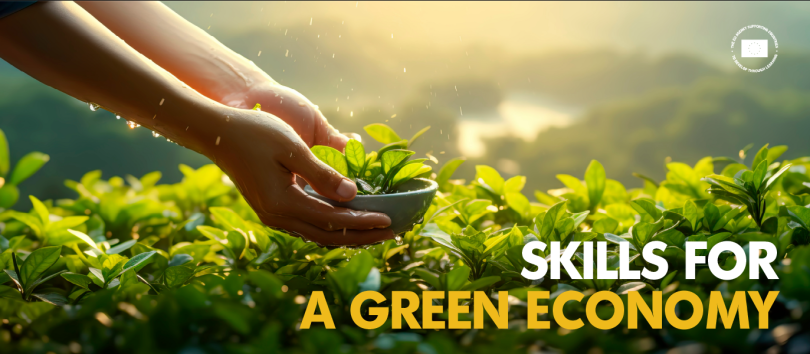
What's needed to build skills for a green economy?
The European Union's (EU) forward-thinking initiatives in green skills development and sustainable growth as part of the European Green Deal demonstrate its strong commitment to tackling climate change, fostering international cooperation and promoting a greener, brighter future for all.
As a global leader the EU's ambitions are enacted worldwide through its external relations and assistance. This is where the European Training Foundation (ETF) operates, providing support to the reform of education and skills development systems in the EU's neighbouring regions so that people are equipped for changing labour markets and societies.
The European Year of Skills that comes to a close in May has given fresh impetus to the importance of lifelong learning to develop the green skills needed to enhance innovation, competitiveness, and inclusion within Europe and beyond.
Our communication campaign in March and April will highlight the various initiatives the ETF is supporting in building skills for the green economy, including the GRETA peer learning network, data and evidence gathering on the state of play in partner countries, the ETF Green Skills Awards, and support for the development of entreprise and entrepreneurship skills to capture the opportunities of the green transition.
Data evidence and gathering
Through the Torino Process, the ETF monitors policy and system performance in support of vocational education and training (VET) and lifelong learning across various dimensions, including access, quality and relevance, and system efficiency.
A key focus area under quality and relevance is the degree to which the curricula in VET and general education incorporate themes related to the green transition within approximately 23 ETF partner countries to the east and south of the EU.
The findings of the 2022–24 edition of the Torino Process reveal three distinct performance categories for including themes for developing green skills in the curricula: high, mid, and low. Around 20% of all participating countries have scores substantially above the international average; some 50% of countries fall within the mid-range category aligned with the international average, signalling a recognition and ongoing integration of green skills; and the remaining 30% of countries have a low performance with a limited openness of the curricula to the green transition.
"Overall, a positive trend towards valuing green skills has been identified, even in those low-performing countries, reflecting significant efforts to weave these competences into VET programmes and educational systems more generally," says the ETF's Mihaylo Milovanovitch, Coordinator for System Change and Lifelong Learning.
Whole institutional and multi-stakeholder approach
The green transition is a cross-cutting policy issue that requires a holistic multi-stakeholder approach and outreach to all individuals, education and training institutions, economic activities and sectors, and societies at large.
The ETF targets different actors (training providers, public employment services, practitioners, researchers, policymakers, officials, companies, social partners and civil society organisations), engaging with them through its different networks such as the ETF Network for Excellence (ENE) and the GRETA peer learning network, the governance network GLAD, and others, providing methodologies and tools to enable the green transitions through skills development, with a particular focus on VET and inclusion within a lifelong learning perspective.
Broad definition of green skills
The ETF interprets ‘green skills’ in a broad sense, including not only technical (or ‘occupation-specific’) skills, but also transversal skills, knowledge and attitudes applicable in all aspects of our lives as outlined in GreenComp, the European Sustainability Competence Framework.
The ETF supports partner countries with the identification of skills gaps and shortages through targeted studies, and anticipation mechanisms. It works to strengthen the skills recognition of prior learning/validation of non-formal and informal learning to facilitate the reallocation of workers across and within occupations, from declining to growing industries.
Ensuring everyone is ready for the green economy
New technologies and innovations in clean energy and sustainable practices require not only the development of new skills but the updating of existing ones due to the transformation of existing professions. The ETF is working at sectoral level in its partner countries, particularly the agri-food sector, engaging with all stakeholders and particularly business representatives and associations to ensure skills development allowing the sector to thrive within the green economy.
The ETF’s work on future skills shows that the greening of jobs often requires higher technical knowledge and skills across all sectors which presents obstacles especially for lower skilled, vulnerable and marginalised groups and individuals. The ETF works in particular with civil society organisations, as explained by the ETF's Siria Taurelli in a recent interview, to ensure everyone, including the most disadvantaged, can develop green skills to access and benefit from the green economy.
Recognising and rewarding green skills development
With the Green Skills Award, the ETF showcases the work of educational institutions leading the green transformation at a global level. The fourth edition of the Green Skills Award is underway and we will soon share about the many innovative examples of good practice featuring in this round as well as those from previous years.
____________________________
Check out ETF webpage Green skills, policy briefing Skilling for the green transition and brief report Skills for the green transition.
Did you like this article? If you would like to be notified when new content like this is published, subscribe to receive our email alerts.